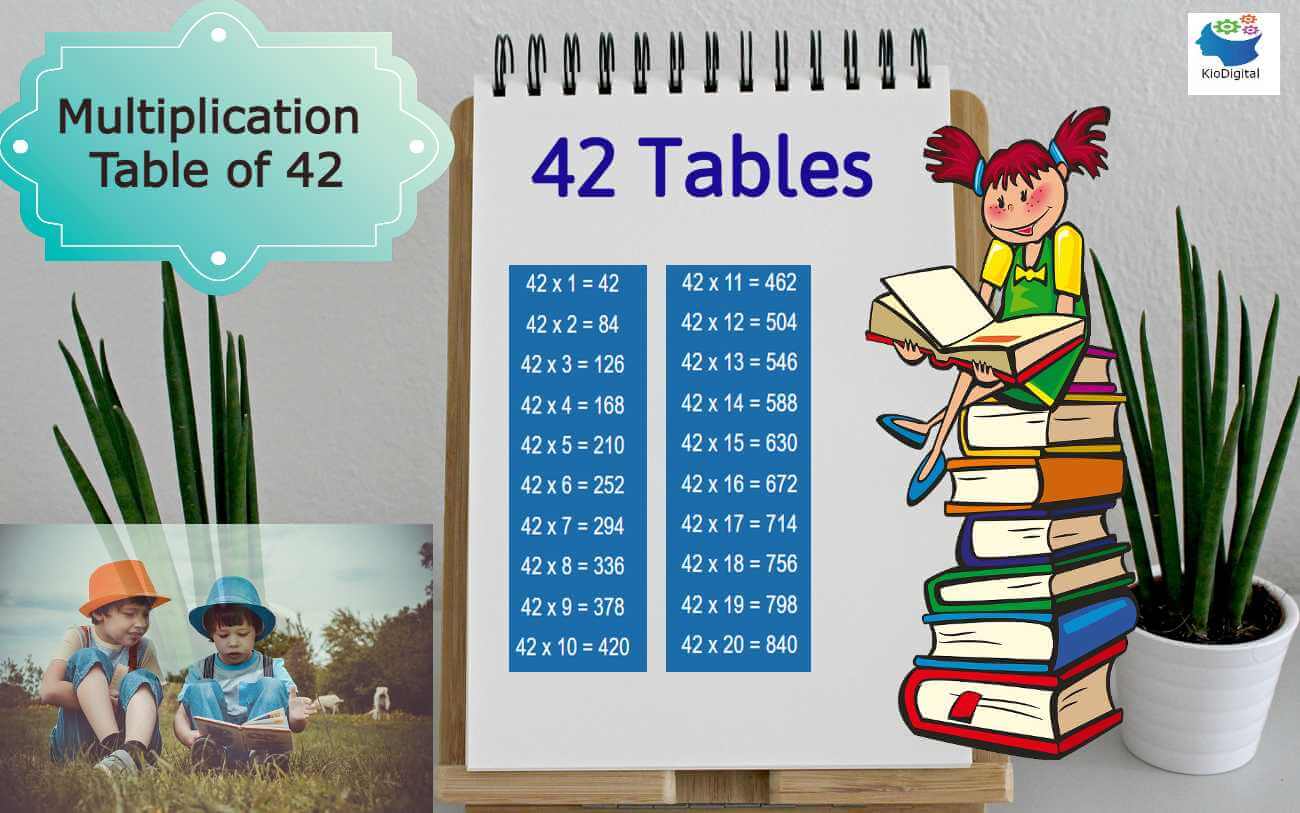The table of 42 is a multiplication table that displays the product of 42 when multiplied by whole numbers. By using this table, one can observe how 42 is repeatedly added when multiplied by different whole numbers. For example, when 42 is multiplied by 2, it results in the addition of 42 to itself 2 times, which equals 84 (42 x 2 = 42 + 42 = 84). Hence, the product of 42 with various whole numbers produces distinct outcomes. To create the table of 42, one can multiply 42 by consecutive positive integers.
Displayed below is the table of 42 that can assist students in performing rapid calculations, which is particularly beneficial during time-sensitive competitive exams where time management is critical. To aid in the memorization of the 42 times table, the table has been presented in various formats, up to 20 times.

Multiplication Table of 42
Visual aids, such as tables and charts, are often more effective in aiding children’s learning. Therefore, an illustration of the 42 times table has been provided below to assist children in quickly grasping and retaining the information.
| 42 Table | ||||
|---|---|---|---|---|
42 x 1 = 42 42 x 2 = 84 42 x 3 = 126 42 x 4 = 168 42 x 5 = 210 42 x 6 = 252 42 x 7 = 294 42 x 8 = 336 42 x 9 = 378 42 x 10 = 420 42 x 11 = 462 42 x 12 = 504 42 x 13 = 546 42 x 14 = 588 42 x 15 = 630 42 x 16 = 672 42 x 17 = 714 42 x 18 = 756 42 x 19 = 798 42 x 20 = 840 | ||||
Table of 42 PDF
The PDF version of the Table of 42 is available for download below, which enables students to learn offline at their convenience.
Download 42 Table PDF for Free |
How to Read 42 Times Table?
The 42 times table is relatively simple to understand and memorize. By following the steps below, you can quickly and easily learn the table.
One time 42 is 42
Two times 42 is 84
Three times 42 is 126
Four times 42 is 168
Five times 42 is 210
Six times 42 is 252
Seven times 42 is 294
Eight times 42 is 336
Nine times 42 is 378
Ten times 42 is 420
Tips to Memorize Table of 42
Memorizing the table of 42 is similar to memorizing other multiplication tables. However, some students may find it challenging due to the larger numbers. Here are some tips to make it easier:
- Break the numbers down into smaller factors: For example, 42 can be broken down into 6 and 7, which are both easier to work with.
- Use the distributive property: For example, to find 42 x 8, you can break it down into (40 x 8) + (2 x 8).
- Practice skip counting: Start with 42 and count by 42s, such as 42, 84, 126, 168, and so on.
- Create flashcards: Write out the multiplication problems on index cards and practice them regularly.
Related Articles:-
- 31 Times Table
- 32 Times Table
- 33 Times Table
- 34 Times Table
- 35 Times Table
- 36 Times Table
- 37 Times Table
- 38 Times Table
- 39 Times Table
- 40 Times Table
- 41 Times Table
- 43 Times Table
- 44 Times Table
- 45 Times Table
- 46 Times Table
- 47 Times Table
- 48 Times Table
- 49 Times Table
- 50 Times Table
- 51 Times Table
FAQs on 42 Tables
What is the result of multiplying 42 by 5?
Referring to the Table of 42, we can find that 42 times 5 equals 210.
How can I use the Table of 42 to multiply larger numbers?
If you need to multiply a larger number by 42, you can break the number down into smaller parts and use the distributive property of multiplication. For example, let’s say you need to multiply 126 by 42. You can break 126 down into 100 + 20 + 6, and then use the distributive property to multiply each part by 42:
126 = 100 + 20 + 6
126 x 42 = (100 x 42) + (20 x 42) + (6 x 42)
126 x 42 = 4200 + 840 + 252
126 x 42 = 5292
So, the result of multiplying 126 by 42 is 5292. This method can be used for larger numbers as well, by breaking them down into smaller parts and multiplying each part by 42 before adding them together.










